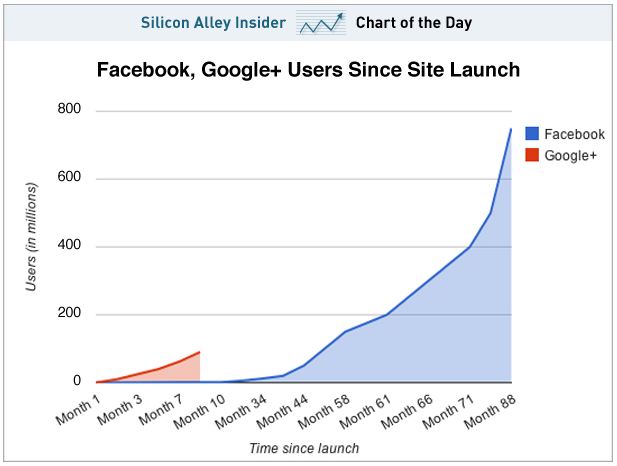There’s no question that yesterday’s filing of Facebook’s initial public offering (IPO) is the hottest topic on Wall Street. With over 845 million monthly active users of its social network, Facebook has become a household name. The IPO appears to be the icing on the cake on one of the biggest years of internet IPOs since 2000. 2011, the year of LinkedIn (LNKD), Pandora Media (P), Groupon (GRPN), and Zynga’s (ZNGA) IPOs saw nineteen companies raise $6.6 billion dollars. Facebook is looking to raise $5 billion according to the filing on Wednesday. It will be interesting to see how many shares trade hands in the first day, especially in today’s world of microsecond algorithmic trading.
What is Social Networking?
If you don’t know what social networking is, it’s the “use of Web sites or other online technologies to communicate with people and share information, resources, etc.”, according to dictionary.com. Some examples include Twitter, MySpace, Classmates.com, LinkedIn, Google Plus, DevianArt, LiveJournal, eHarmony, match.com and more. But Facebook tops them all with 845 million users. The closest ranking social site after Facebook is Twitter with 250 million users and LinkedIn with 110 million users. Social networking sites are the medium the internet generation uses to communicate event planning, updates, upload pictures, and play games. It’s a hub for sharing funny videos, political views, or anything you'd like the world to know about.
Facebook’s founder, Mark Zuckerberg – 27 years old – started the social network for his college classmates while going to school at Harvard. That network spread to other colleges and then to everyone aged 13 and up. He’s even had a movie written and produced about his role in the development of the company, called “The Social Network” – currently ranked 14th in Netflix’s top 100 movies with three academy awards, four golden globes, four critic’s choice awards, and best picture of the year from a litany of periodicals.
The Filing
To do an IPO, a company must file an S-1 document with the Securities and Exchange Commission that includes company description and financial position. Once approved by the SEC, private shareholders then make a vote to approve the IPO using information from the S-1 filing. While this is happening, an underwriter and exchange is picked along with a trading symbol.
So yesterday, the company filed a $5 billion IPO with Morgan Stanley as the lead underwriter. The ticker Facebook will trade under FB, but I have not heard whether that will be on the NASDAQ or the New York Stock Exchange (estimating it’s the latter). In the filing, Facebook talked about a 24-fold increase in sales over the last four years to $3.71 billion in 2011. As we’ve typically seen in internet IPOs since the 90’s, only a small amount of shares will get fed to the public with most of the $75 to $100 billion residing within the company and various institutions.
The Risks
Within the filing, Facebook not only talked about its revenue growth and purpose for the $5 Billion to be raised, but also talked about the risks the company faces to its growth. They listed Google Plus, Twitter, and other social networks as competition. In addition, the filing mentioned they see mobile technology as a key area they lace much of a footprint in. They cited revenue linked mainly to home computers instead of smart phones and tablet PCs as Facebook’s mobile software hasn’t shown “meaningful revenue”. Which, of course, brings us to the question of how they generate their revenue in the first place.
Like most non-retail websites, Facebook gets most of its revenue from advertising—around 85% of it currently. The average user (845 million monthly active users) spent around 8 hours on their site last year. That number continues to grow as they add more content like video games, event calendars, and seamless news updates on what your friends and family are doing. The other 15% in revenue they earn from virtual money spent on vanity and game items.
Because such a large chunk of their revenue is from advertising, many of the risks inherent with that business are inherent with Facebook. In the S-1 filing, they emphasized advertising risk in case:
- The number of users drops
- A shift in Facebook viewing from computer to mobile products – where they lack meaningful revenue.
- Advertisers only allocate a small portion of their advertising budget to Facebook
- Thought of as “experimental and unproven” by advertisers
- Advertisers could reduce the prices they’re willing to pay Facebook if results don’t prove successful click-through to sales.
- Censorship – the ability to block content on Facebook by governments (especially in China)
The final risks they talked about are their ability to grow and their dependency on Zynga currently for revenue derived from payments (12% of the other 15% of revs roughly). Numbers show that year over year quarterly revenue growth has decelerated. They even say it on their S-1, “We expect our rates of growth will decline in the future”, as they gave the example of their annual revenue growing from 154% from 2009 to 2010 and 88% from 2010 to 2011. They clearly state on the S-1 that the primary source of growth in their revenue was user base growth. As they penetrate the world market, that growth will slow.
Business Insider: Chart of the Day
The Future
For you as a possible investor to buy Facebook shares, you need to see that revenue and earnings will increase to warrant a more expensive market capitalization after the IPO. The price multiple could get “hotter” but that only creates a bubble if they can’t show results. At 0 billion that’s being thrown around to value Facebook, that’s a hefty price multiple. We’ll need to see growth in revenues and earnings to justify high or higher multiples which is not impossible. By the way, don’t forget that after 91 days from the prospectus date, private restricted shareholders of Facebook can begin selling their shares. Also, don’t forget about Google Plus when you decide to push the buy trigger. They’re adding users at a pace that eclipses Facebook’s start.
Source: Business Insider: Chart of the Day
Social internet networking is a relatively new business and recently, Facebook has found one of many ways to leverage its viewer base other than advertising with Zynga—the online browser-based gaming company and designer of FarmVille, Mafia Wars, and more. I’m sure there are other ways the company could leverage 845 monthly active users. They’ll just need to execute.
The Facebook IPO is so hot, John Nester of the SEC said they had to bring additional capacity for web traffic to be able to view the S-1 filing. I’ve received multiple calls from clients asking how they can get in, referencing the success of Google’s IPO at a share in 2004. At a 0 billion market cap, and 28.4 percent of the shares, that could put Mark Zuckerberg among the top 10 wealthiest billionaires in the world under Eike Batista, Brazil’s richest man who owns “things” like oil, mining, shipbuilding, tourism, and entertainment. Not bad for a 27-year old.
“Mark…so hot right now…” (Zoolander)








